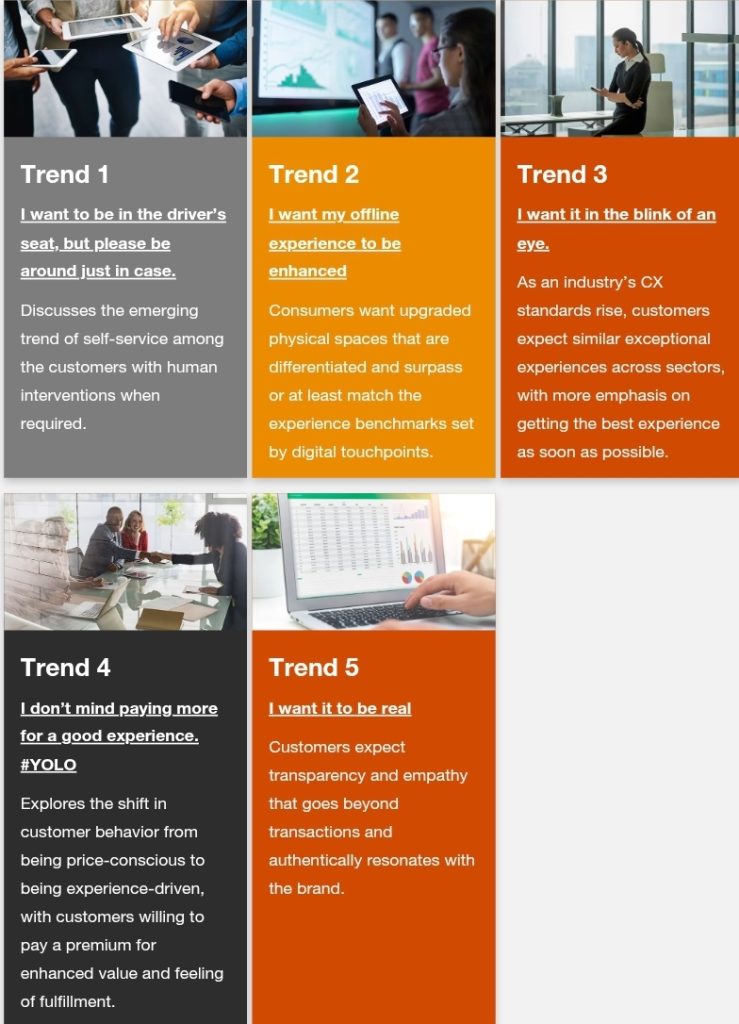Customer Experience Revolution: What 2025 Reports Reveal About AI-Driven CX Success and Customer Experience Trends
The customer experience landscape stands at a pivotal crossroads. Moreover, artificial intelligence emerges as the defining force reshaping how businesses connect with customers. Furthermore, comprehensive industry reports reveal both unprecedented opportunities and significant challenges ahead. Let’s have a deep look on Customer Experience Trends.
The Current State: A Wake-Up Call for Brands
Initially, let’s examine the sobering reality facing today’s brands. According to Forrester’s 2025 Global Customer Experience Index, 21% of brands declined globally. Additionally, only 6% improved while 73% remained unchanged. Consequently, this stagnation signals a critical need for transformation.
However, the situation becomes more concerning when examining specific regions. Specifically, in North America, 25% of brands declined for the second consecutive year. Meanwhile, only 7% showed improvement. Furthermore, Pete Jacques, Principal Analyst at Forrester, warns: “Customer experience continues to erode worldwide, reflecting a concerning multiyear downward trend and a shift in sentiment from positive to neutral”.
Nevertheless, these challenges create opportunities for forward-thinking organizations. Subsequently, brands embracing AI-driven strategies demonstrate remarkable performance differences.
The Trendsetter Advantage: AI as the Great Differentiator
Transitioning to success stories, Zendesk’s comprehensive 2025 Customer Experience Trends Report reveals extraordinary insights. Notably, the study analyzed over 10,000 global consumers and business leaders across 22 countries. Consequently, clear patterns emerge separating leaders from laggards.
Specifically, companies termed “CX Trendsetters” achieve remarkable results through AI integration. For instance, these organizations experience 33% higher customer acquisition rates. Additionally, they demonstrate 22% higher customer retention rates. Furthermore, they generate 49% higher cross-sell revenue compared to traditional approaches.
Moreover, the financial impact extends beyond revenue metrics. Importantly, 90% of CX Trendsetters report positive returns on AI tools for agents. Similarly, 56% of CX Trendsetters prioritize using AI to personalize customer experiences.
Tom Eggemeier, Zendesk CEO, emphasizes this transformation: “AI should be more than just another technology we use—it’s a way to bring companies and customers closer, and it’s redefining the relationships we can build”.
Customer Experience Trends: Five Critical Trends Reshaping Customer Experience
1. Autonomous Service Accelerates with AI Copilots
Initially, AI copilots transform agent productivity and service delivery. Specifically, 73% of agents believe AI copilots would help them do their job better. Additionally, these tools free agents to focus on complex issues requiring human expertise.
Furthermore, the trajectory toward autonomous service accelerates rapidly. Remarkably, 75% of CX leaders expect 80% of customer interactions resolved without human intervention in the near future. However, this shift demands careful attention to security and data privacy concerns.
2. Consumer Confidence Rises with Human-Like AI Agents
Subsequently, customers increasingly expect AI interactions that feel genuinely human. Specifically, 64% of consumers trust AI agents that embody traits like friendliness and empathy. Consequently, companies investing in personality-driven AI report significant satisfaction improvements.
Additionally, real-world results demonstrate this approach’s effectiveness. For example, Shabib Sheikh from Vagaro reports: “By leveraging Zendesk’s AI, we’ve resolved 44% of incoming requests, reduced resolution time by 87%, and increased CSAT to 92%”.
3. Personal AI Assistants Shape Future Interactions
Moreover, personal AI assistants reshape customer service expectations. Notably, 67% of consumers are ready to delegate tasks like tracking orders to AI. Similarly, customers expect assistant-driven experiences throughout their journey.
Furthermore, this trend reflects broader technological adoption patterns. Consequently, businesses preparing for assistant-first interactions gain competitive advantages through seamless, responsive experiences.
4. Voice AI Gains Ground for Complex Issues
Additionally, voice technology emerges as the preferred channel for nuanced interactions. Specifically, half of consumers have engaged with Voice AI and want natural conversational experiences. Moreover, 90% of Trendsetters recognize voice AI as the next evolution in customer communication.
Furthermore, voice AI provides customers with a sense of being truly heard and understood. Consequently, this capability proves especially valuable for handling complex inquiries requiring empathetic responses.
5. Personalization Redefines Customer Loyalty
Finally, personalized service becomes the ultimate loyalty differentiator. Importantly, 61% of consumers expect AI-driven interactions to feel tailored to them. However, expectations continue rising while tolerance for poor experiences diminishes.
Specifically, 63% of customers will switch to competitors after just one bad experience, representing a 9% year-over-year increase. Therefore, personalization transforms from nice-to-have into business-critical necessity.
Global Success Stories: AI Implementation Excellence
India’s Remarkable Progress
Meanwhile, PwC’s “CX in the age of AI and beyond” report highlights India’s leadership in AI adoption. Notably, 34% of India CEOs reported increased profitability from GenAI. Additionally, 36% reported revenue growth from GenAI in the past year.
Furthermore, forward-looking indicators suggest continued momentum. Specifically, 51% of Indian CEOs expect GenAI to increase profitability over the next year. Moreover, 50% of India CEOs and employees report GenAI boosted productivity by more than 50%.
Personalization ROI Achievement
Additionally, advanced personalization delivers measurable returns. Significantly, 70% of brands using advanced personalization obtained 200% ROI. Furthermore, companies embracing omnichannel strategies achieve 9.5% surge in annual revenue.
Ravi Santhanam from HDFC Bank explains: “The power of AI can be fully realised by being curious and encouraging teams to find solutions in areas hitherto not even considered”.
Customer Experience Trends: The Technology Investment Surge
Subsequently, technology giants demonstrate unprecedented commitment to AI infrastructure. Specifically, tech companies plan to allocate up to $320 billion to AI and data centers in 2025, increasing from $230 billion in 2024.
Moreover, this investment surge reflects intensifying competition and infrastructure requirements. Consequently, businesses must prepare for rapidly evolving technological capabilities and customer expectations.
Critical Challenges Demanding Attention
Employee Experience Correlation
However, success requires addressing fundamental organizational challenges. Specifically, Forrester identifies weaker employee experience as a primary factor in CX decline. Additionally, waning customer obsession and disappointing tech implementations compound these issues.
Furthermore, the correlation between employee and customer experience becomes increasingly apparent. Therefore, organizations must simultaneously invest in both workforce development and customer-facing technologies.
Economic Volatility Impact
Additionally, economic volatility continues affecting customer perceptions of value. Consequently, customers struggle to justify financial investments in brand interactions. Therefore, companies must demonstrate clear value propositions while managing cost pressures.
Strategic Implementation Roadmap
Immediate Priorities
First, organizations should assess their current AI maturity levels. Subsequently, they must identify specific use cases delivering measurable customer value. Additionally, implementing pilot programs allows for learning and refinement before scaling.
Medium-Term Development
Furthermore, companies should invest in employee training and change management programs. Similarly, establishing ethical AI governance frameworks ensures responsible deployment. Moreover, developing omnichannel integration capabilities creates consistent experiences.
Long-Term Transformation
Finally, organizations must prepare for autonomous service models while maintaining human oversight. Additionally, continuous innovation cycles enable adaptation to evolving customer expectations. Furthermore, data-driven decision making becomes essential for sustained competitive advantage.

source pwc
Future Outlook: The Path Forward
Looking ahead, the customer experience landscape will continue evolving rapidly. Consequently, organizations embracing AI-driven transformation position themselves for sustainable success. However, those maintaining traditional approaches risk falling further behind competitors.
Moreover, the evidence clearly demonstrates AI’s transformative potential when implemented thoughtfully. Furthermore, companies focusing on human-centric AI development achieve superior results across all key metrics.
Additionally, the integration of emotional intelligence into AI systems represents the next frontier. Subsequently, brands understanding both customer words and feelings will create deeper, more meaningful relationships.
The customer experience revolution is underway. Therefore, organizations must act decisively to harness AI’s potential while maintaining the human touch that customers ultimately value. Furthermore, the reports make clear that success requires commitment, investment, and strategic focus on customer-centric outcomes.
Ultimately, the brands thriving in 2025 and beyond will be those successfully balancing technological innovation with genuine human empathy. Consequently, the future belongs to organizations viewing AI not as a replacement for human connection, but as a powerful amplifier of meaningful customer relationships.
This analysis draws from comprehensive industry reports including Zendesk’s 2025 CX Trends Report, Forrester’s Global Customer Experience Index 2025, and PwC’s “CX in the age of AI and beyond” study, representing insights from hundreds of thousands of customers and business leaders worldwide.

